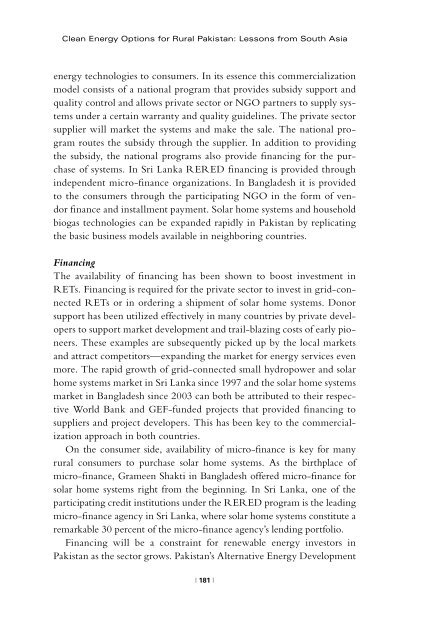fueling the future - Woodrow Wilson International Center for Scholars
fueling the future - Woodrow Wilson International Center for Scholars
fueling the future - Woodrow Wilson International Center for Scholars
- No tags were found...
You also want an ePaper? Increase the reach of your titles
YUMPU automatically turns print PDFs into web optimized ePapers that Google loves.
Clean Energy Options <strong>for</strong> Rural Pakistan: Lessons from South Asiaenergy technologies to consumers. In its essence this commercializationmodel consists of a national program that provides subsidy support andquality control and allows private sector or NGO partners to supply systemsunder a certain warranty and quality guidelines. The private sectorsupplier will market <strong>the</strong> systems and make <strong>the</strong> sale. The national programroutes <strong>the</strong> subsidy through <strong>the</strong> supplier. In addition to providing<strong>the</strong> subsidy, <strong>the</strong> national programs also provide financing <strong>for</strong> <strong>the</strong> purchaseof systems. In Sri Lanka RERED financing is provided throughindependent micro-finance organizations. In Bangladesh it is providedto <strong>the</strong> consumers through <strong>the</strong> participating NGO in <strong>the</strong> <strong>for</strong>m of vendorfinance and installment payment. Solar home systems and householdbiogas technologies can be expanded rapidly in Pakistan by replicating<strong>the</strong> basic business models available in neighboring countries.FinancingThe availability of financing has been shown to boost investment inRETs. Financing is required <strong>for</strong> <strong>the</strong> private sector to invest in grid-connectedRETs or in ordering a shipment of solar home systems. Donorsupport has been utilized effectively in many countries by private developersto support market development and trail-blazing costs of early pioneers.These examples are subsequently picked up by <strong>the</strong> local marketsand attract competitors—expanding <strong>the</strong> market <strong>for</strong> energy services evenmore. The rapid growth of grid-connected small hydropower and solarhome systems market in Sri Lanka since 1997 and <strong>the</strong> solar home systemsmarket in Bangladesh since 2003 can both be attributed to <strong>the</strong>ir respectiveWorld Bank and GEF-funded projects that provided financing tosuppliers and project developers. This has been key to <strong>the</strong> commercializationapproach in both countries.On <strong>the</strong> consumer side, availability of micro-finance is key <strong>for</strong> manyrural consumers to purchase solar home systems. As <strong>the</strong> birthplace ofmicro-finance, Grameen Shakti in Bangladesh offered micro-finance <strong>for</strong>solar home systems right from <strong>the</strong> beginning. In Sri Lanka, one of <strong>the</strong>participating credit institutions under <strong>the</strong> RERED program is <strong>the</strong> leadingmicro-finance agency in Sri Lanka, where solar home systems constitute aremarkable 30 percent of <strong>the</strong> micro-finance agency’s lending portfolio.Financing will be a constraint <strong>for</strong> renewable energy investors inPakistan as <strong>the</strong> sector grows. Pakistan’s Alternative Energy Development| 181 |
















